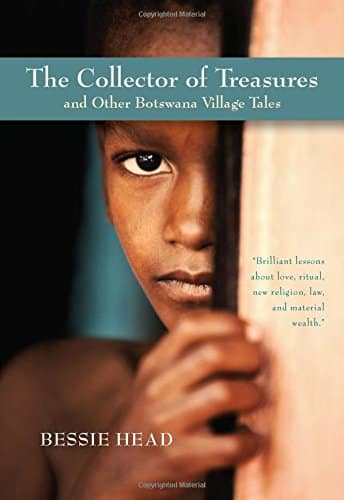In an attempt to assimilate to a classist, discriminatory society, women and their families within postcolonial Botswana, struggle to survive in a male dominated environment supported by no one but their ambition to survive. Bessie Head’s The Collector of Treasures, discusses Botswana native culture, the classifications of society, AND the gender discrimination that cultivates the difficulties of living in a post colonialistic society while being marginalized as a woman.
Through the eyes of Dikeledi, Head uses this short story to give a perspective of how unfair, and at times extremely inhuman, the societies of postcolonial society can be on an already struggling society, mainly for women. The descriptions of this society can be categorized using nativism, class, and discrimination. Nativism can be described as the return to indigenous culture and practices of pre-colonialism. In the context of the short story, The Collector of Treasures, nativism is actually connoted to be an increasingly negative thing because of the basis of the pre-colonized society.
Women, as part of the Botswana culture, were considered the lesser of the society, given little value and even were given little support for their families. This ties into the idea of class within a postcolonial society, men were given the most opportunity to create a better life for themselves and their families. However, they chose to use their advantage in economic class and social class, to neglect the necessities of their families and partake in their own wants and desires. The discriminatory element of the story follows the implications of women in the society, because they are women and are treated as lesser as human beings.
Men are allowed to commit unspeakable acts within the society with minimal punishment, but the implications of a crime committed by a woman are considered to be detrimental. Women within the short story The Collector of Treasures reflect the consequences of a society that promotes misogynistic idealism, whilst allowing the men of the society to simultaneously dampen the integrity of the society itself. Head’s description of men, through the perspective of Dikeledi, gives a critique of the negative effects that nativist views would have on women in Botswana.
Head describes the men of Batswana as the “Kind of man to blame for the breakdown of family life in Botswana. He has been breaking up families for a long time in Botswana’s history. He was here before the white man came to Africa. He lived according to the traditions of his tribe and obeyed the rules of his tribe. But he never asked himself if these rules or traditions were good or bad. He just accepted them,” which highlights the troublesome characteristics of the Botswana man pre-colonialism (Head 9).
Although this particular situation’s complexity can be deemed controversial because of the system that the Botswana community had in place prior to colonialism, when it came to the postcolonial society, the precolonial behaviors of men only began to worsen. Head comments on what man had to face when the ‘white man’ came and colonized Botswana; the men of Botswana were diminished by the colonizers. The focus of the situation was the fact that man had lost his sense of self and when “independence came to Botswana it made this man worse not better” because of the postcolonial effects on the man’s mental view of himself (Head 9).
Another interesting introspective view of the Botswana postcolonial society is the classist discrimination that blossoms after the nativist perspective is introduced back into the society. The view of women remains the same, and if not gets worse, because of the new independence that has been implemented in the society. The minority group, that is women, becomes increasingly more neglected in the grand scheme of the society.
Returning to the cultural roots of the society, post colonialization, gives women a difficult time assimilating to a society where men are considered to be more dominant and where it is accepted that men neglect their families.
The end of colonialism was written off to be a positive in western society, however, in many cases the countries of the occupied regions still struggled with the assimilation of a new society after being controlled by the British colonizers.
Women were continuously suppressed into having very little freedom and relying solely on men for financial stability. It causes a societal gentrification where if the ‘man of the family’ refuses to help with the family, and the family is left to struggle within a society where they can have no economic gain of their own.
The ending of The Collector of Treasures is a prime example of giving women the power to react to their marginalization and lack of ability to live as human beings in a seemingly ‘freed’ society. All these women want is to provide for their families with the help of their husbands, but even the bare minimum of society is not enough for them to survive.

